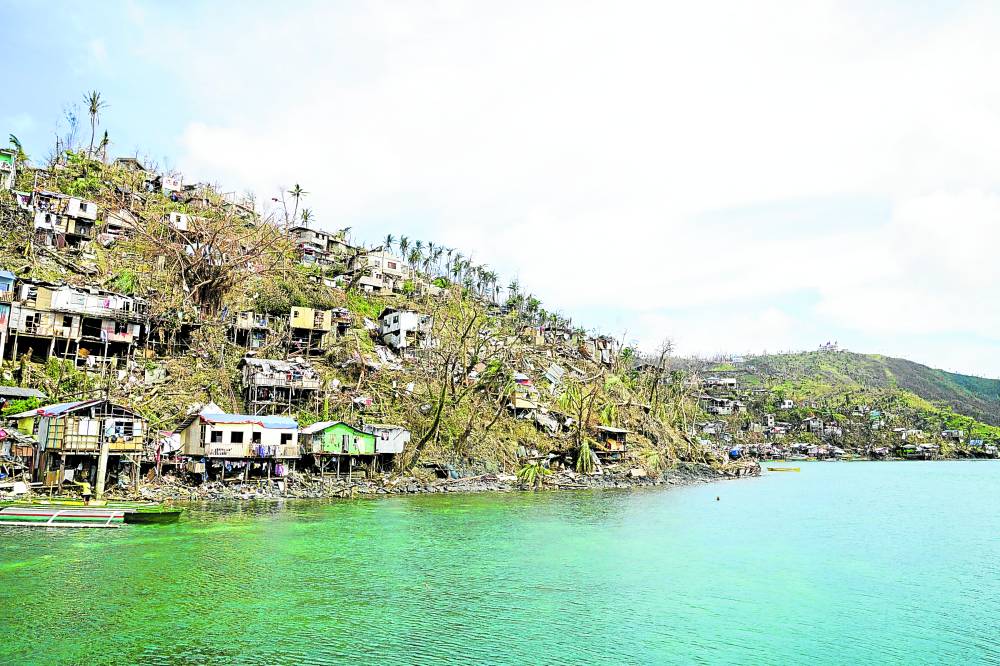
SCARRED The people of Dinagat Islands are left scarred by Typhoon “Odette,” which carved a wide swath of destruction in Visayas and Mindanao on Dec. 16. —MALACAÑANG PHOTO
MANILA, Philippines — Senatorial aspirant and former Philippine National Police chief Guillermo Eleazar, on Monday, stressed the need to provide more funding for the country’s research and development in order to improve disaster response measures after the onslaught of Typhoon Odette.
In a statement, Eleazar pointed out that being well-equipped in research and development would help address the common problems faced by residents during times of calamities, such as the lack of water and power supply.
“Napakaraming matatalinong estudyante at magagaling na scientists sa ating bansa na hindi lang nabibigyan ng pagkakataon dahil sa kakulangan ng suporta (Our country has many bright students and great scientists who are not given the opportunity due to the lack of support). We should invest on them for our future,” said Eleazar, who is running under the slate of Senator Panfilo Lacson and Senate President Vicente Sotto III.
Eleazar also underscored the importance of localizing funding for research since students and scientists in the universities in the province have more experience and are more exposed to local environments in their respective areas.
“Naniniwala ako na napakalaki ng maitutulong mga nasa estudyante at scientists ng mga colleges and universities sa mga probinsya upang matugunan ang mga basic na pangangailangan ng ating mga kababayan sa pagresponde sa mga kalamidad,” he said.
(I believe that our students and scientists in our colleges and universities in the province will contribute a lot to address the basic needs of our countrymen in our response to calamities.)
“Ang bagyong ‘Odette’ ay isa na namang wake-up call para sa atin na maging forward-looking tayo kaya umpisahan na nating pondohan ang science and technology research development na may kinalaman sa disaster response ng mga colleges and universities sa probinsya kagaya ng teknolohiya na maari nating gamitin kung putol o naapektuhan ang water supply, alternative community electrification at iba pa,” he added.
(Typhoon Odette was yet another wake-up call for us to be forward-looking that’s why we need to fund science and technology research development in terms of disaster response in our colleges and universities in the provinces for the technology we need to address water supply woes and to provide alternative community electrification, among others.)
The damage brought about by the typhoon should be a lesson for the national government to invest in the fields of science and technology to address further the impacts of a similar calamity, Eleazar said.
With “more damaging typhoons” likely to hit the Philippines in the future due to its location, Eleazar added that the government should focus on how it will respond well to these calamities.
“Hindi puwede na lagi na lang tayong nagpapatutsadahan kung sino ang nauna sa ground zero ng kalamidad at nagsisisihan lagi kung bakit mabagal ang responde ng pamahalaan,” he said.
(We can’t keep on bickering about who got to ground zero of a calamity first and blame one another for the slow response of the government.)
“Marami na tayong kalamidad na pinagdaaanan at marami pa tayong pagdadaanan. Ito ay isang matagal ng new normal na dapat nating pagtuunan ng pansin dahil ang nakataya din dito ang buhay at kabuhayan ng ating mga kababayan,” he added.
(We have gone through a lot of calamities and we expect more to come. This has long been the new normal that we should focus our attention on because the lives and livelihood of our countrymen are at risk.)
The National Disaster Risk Reduction and Management Council (NDRRMC) has so far reported 389 deaths due to Typhoon Odette.
The NDRRMC also said 64 individuals remain missing while 1,146 were injured.
The latest report also showed that over 1.07 million families or more than 4.2 million individuals in 429 cities or municipalities were affected by the typhoon, which ravaged parts of Visayas and Mindanao during its onslaught.